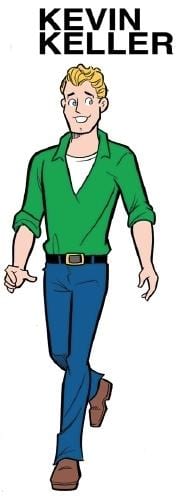At long last, Archie Comics (AC) — the behemoth of PG teen spirit in the pen-and-ink industry — will be furnishing Riverdale, honeyed home of Archie and the Gang, with its first fag. The story — which breaks on September 1 via the Veronica series — follows spoiled-rotten tempest Veronica Lodge as she attempts to snatch the heart of Kevin Keller, the clean-cut, golden-haired (and, unbeknownst to Veronica, homo) hunk new to Riverdale High.
Says Archie co-CEO, Jon Goldwater: “The introduction of Kevin is just about keeping the world of [AC] current and inclusive. Archie’s hometown of Riverdale has always been a safe world for everyone. It just makes sense to have an openly gay character in Archie comic books.”
It does make sense. But let’s be honest: the only “safety” for which the world of Riverdale has been known since its 1942 premiere is its sterility. Indeed, it wasn’t until 1974 that the comic got its first character of colour, African-American Chuck Clayton. And while recent years have seen further diversification of the cast (Raj Patel, Tomoko Yoshido), these characters are “safely” sideliners who “safely” fuck one another.
Sure, Archie has recently begun knocking boots with Valerie Brown, the African-American bassist of Josie and the Pussycats. But as Chris Sims (of ComicsAlliance.com) and Dwayne McDuffie (ex-Archie writer) note, AC has a history of “re-colouring” potential black characters as Caucasian — most notably, in 1992 and 2008. Both characters in question were teenaged black males slated to court white girls — corn-fed Betty and ritzy Cheryl Blossom, respectively. What’s at stake in the world of Riverdale, then, is the security of straight white masculinity.
To that end, a queer in Riverdale doesn’t bode well.
In fact, in 2003, Roberto Aguirre-Sacasa’s homo romp through Riverdale, a play which featured a flaming Archie — was nearly quashed hours before opening when Atlanta-based Dad’s Garage Theatre received an ultimatum: halt production or face litigation.
“[Archie Comics] thought if Archie was portrayed as being gay, that would dilute and tarnish his image,” says Sean Daniels, the theatre’s artistic director. After a mad-scramble rewrite, Archie’s Weird Fantasy became Weird Comic Book Fantasy and hit the stage. (The 2006 GLAAD-Media-Award-nominated play is now titled Golden Age.)
Indeed, AC has always been batting from the ultraconservative right. Co-founder John L Goldwater led the 1954 establishment of the Comics Code Authority — the heavy-handed goliath of comic-book censorship (which emerged in the wake of those comic-books-and-juvenile-delinquency congressional hearings).
And, of course, there was the 1973-1982 Christian-right series that they published in addition to the “regular” Archie comics. Witness as an evangelical Archie and the Gang spread the word! When questioned by The New York Times, Goldwater explained that the deal with Spire Christian Comics suited AC’s “wholesome family message.”
Michael Silberkleit (AC co-owner and publisher until his 2008 death) later noted that the Christian series wasn’t meant for routine readers: “One thing we don’t want is people telling us they got an Archie comic to be entertained and they’re being preached to.”
Nope, nobody likes a soapbox. But the Riverdale world order — heterosexual amour-lite organized around white masculinity’s fear of blackness — is an evangelist in its own right. AC’s youth audience makes this all the more problematic. As Salon.com’s Douglas Wolk notes, “[S]tories for children don’t just reflect the world, they shape it.”
So, while a queer in Riverdale is long overdue, the inclusion of Kevin Keller is hardly queer. In fact, it’s the safest bet for a comic bent on preserving straight white masculinity. How? Because mainstream culture’s fear of “deviant” (read: black and/or gay) male sexuality consistently renders these bodies politely asexual – and therefore “safe.” (The cultural acceptability of lesbians, on the other hand, depends upon triple-X fantasy, namely straight masculinity’s ability to imagine itself sandwiched in between — a lascivious insistence that’s too lewd for Riverdale).
We need only look to the wildly sexphobic backlash generated by Adam Lambert’s deliciously deviant performance at the 2009 American Music Awards (which featured boy-boy make-out and briefly suggested a blowjob) to remind us just how rigidly gay male sexuality is policed: the West Coast broadcast was censored; Lambert’s upcoming ABC performances were cancelled; ABC began tightening its performer contracts (to ensure live shows mimic rehearsals); and homophobes everywhere denounced Lambert as “obscene” and “disgusting.”
Riverdale’s Kevin Keller might be gay. But he’s not queer.

 Why you can trust Xtra
Why you can trust Xtra


